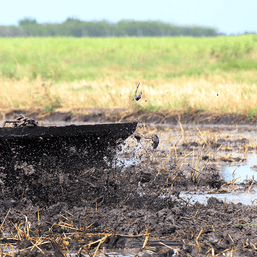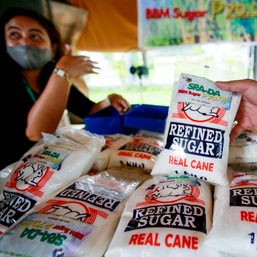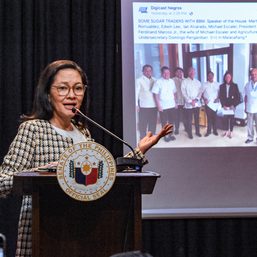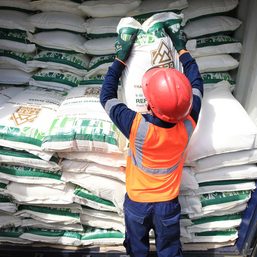SUMMARY
This is AI generated summarization, which may have errors. For context, always refer to the full article.
![[Vantage Point] Sugar mess gets messier (Part 2)](https://www.rappler.com/tachyon/2023/04/Sugar-mess-April-1-2023-f.jpg)
Read Part 1
Up to now, Senator Francis Tolentino, the chamber’s blue ribbon committee chairman, has not lifted a finger on the resolution filed by Senator Risa Hontiveros to probe the importation without a valid permit of some 440,000 metric tons of sugar.
Sugar industry stakeholders fear this illegal act will be consigned to the dustbin of history, much like other pressing issues through the years which have been ignored or swept under the rug by this committee. Well, if the President himself can get away with not paying his taxes, why wouldn’t this issue be treated any differently? This comparison is certainly salacious enough to chew on, even if it’s so bad that it’s enough to give one a terrible breath. But the impunity is so vulgar that the stench is too ghastly to ignore.
I can sense Hontiveros’ exasperation even if she remains courteous to her Senate colleagues. “Hihintayin ko na lang sana ang ating butihing chair ng blue ribbon para dinigin ang usaping ito pero the time-sensitive and urgent developments of the matter compel me to share this with you all, and with the Filipino public,” Hontiveros said in a statement.
The senator is not alone. Many in the industry see this wanton disregard of the law as “nothing less than large-scale agricultural smuggling,” “an unfolding crime” and “nothing less than economic sabotage involving billions of pesos.”
What enrages stakeholders is Hontiveros’ revelation about one industrial user who approached Agriculture Senior Undersecretary Domingo Panganiban seeking permission for his company to directly import sugar from Thailand. Panganiban refused because he wanted all sugar importation to be coursed through his three handpicked traders – Sucden Philippines Incorporated, Edison Lee Marketing Corporation, and All Asian Countertrade Incorporated – which he claims are “most capable.” But are they really?
Vantage Point has already unearthed that Sucden, a wholly owned American company, suffers from net capital loss and has no financial standing, based on the latest financial statement it submitted to the Securities and Exchange Commission (SEC).
An independent auditor’s report prepared by Reyes Tacandong & Co. reveals that, as of December 31, 2022, the company has a capital deficiency of $394,103 and $35,784 “resulting from continuing losses.” The report concludes, “This condition raises doubt on the Company’s ability to continue as a going concern.”
The other two, however, are suspected by stakeholders to have used political influence in securing the lucrative deal. Photos of their owners hobnobbing with President Ferdinand Marcos Jr. have been making the rounds of social media sites. The photos alone do not impugn guilt, but the message they send at the time when their companies’ are in the spotlight says a lot.
As instructed, the industrial user went to All Asian and was given a quote of P85 per kilo, which Hontiveros calls “appalling.”
“You can buy refined sugar wholesale for P25 pesos per kilo in Thailand,” she explains. “Kung matino kang importer, you know that you will already get a decent profit if you sell sugar at P61, bayad na doon ang warehousing, duties, handling, at may maayos ka na na profit (of P8 per kilo) per industry standard at a wholesale price point of P61.”
“The P85 asking price of All Asian imposes an additional P24-super profit for a total of (P24 plus P8) P32-per-kilo profit. Multiplied by 440,000 metric tons, ang tubo mo na lampas sa normal ay P10.5 billion. Malaki kung para sa three traders lang. Kung kasama ang normal profits, ang total ay P14 billion!…Sa ganoong tubo na pinaghahatian lang ng tatlo, ‘di mahirap isipin kung magkano ang kickback diyan. Ang asukal mo, may sweetener,” the senator added.
Abolish the SRA
For industry players, the Sugar Regulatory Authority (SRA) is the “problem” and not the solution. In fact, House Bill No. 5081 which seeks to abolish the agency had been filed on September 21, 2022 by Manila 6th District Representative Benny Abante Jr.
The bill explains that the SRA “has not helped find any solution” to the looming food crisis triggered by a “problematic sugar industry.” The bill says that the industry problem is exacerbated by the “incompetence and corruption that is prevalent in the SRA.”
Indeed, Republic Act 8178 or the Agricultural Tariffication Act of 1996 has already done away with quantitative restrictions on importation of agricultural products, with the exception of rice.
The law however has yet to be implemented. Sugar importation continues to be held tightly by the SRA which at the same time enforces various regulations on the domestic sugar industry, including restrictions on the inter-island shipping of sugar and mandatory sharing arrangement between sugar mills and sugarcane planters.
This is the main reason that domestic sugarcane production is yet to achieve higher productivity even as the industry as a whole tries its best to be more competitive. The country’s sugar industry will remain stagnant and besieged by these problems, unless structural problems which have afflicted the industry for so long are addressed.
Select agricultural sectors are protected by tariffs. If the tariff is in place, then there is no need for quotas, as the tariff carries the burden to protect the sector. Imports should be open to all and any importing business entities. Under the ASEAN Free Trade Agreement, quotas must be abandoned once a commodity has had a tariff applied.
If the government determines that quotas are essential, then these should be auctioned off in a straightforward, on-line auction to ensure transparency and generate a revenue for the government, although the retention of quotas is highly undesirable and may be illegal as per the ASEAN agreement. The revenues from collected tariffs should be directed to well-designed industry adjustment schemes, with the clear intention of reaching a tariff of 0% in 10 years.
The heavy hand of regulation that the SRA insists on implementing has been a failed experiment, with domestic sugar prices soaring far higher than import-parity pricing, and tainting a completely uncompetitive industry with the scent of state-sponsored corruption.
The Agricultural Tariffication Act of 1996, which has eliminated quantitative restrictions on the importation of agricultural products (except rice, tariffed much later in 2018) and replaced them with more transparent import tariffs, should be respected and not mutilated which was what happened to the sugar industry with Executive Order No. 18, and reinforced under the Sugar Industry Development Act (SIDA) of 2015 (R.A. 10659), which created domestic and international trading restrictions implemented by the SRA.
Maintaining the SRA to ensure sugar could be delivered to fill the preferential US sugar quota allocation has been rendered irrelevant because the Philippines no longer has surplus sugar for export.
Planter-miller sharing agreement
There is also this planter-miller sharing arrangement that is exclusive to the sugar industry (RA 809), under which planters collect 70% of the milled sugar, while the millers get only 30% as “service fee.”
This is so unlike the direct crop payments practiced for other farm products, and with the cane purchase system that is practiced globally. Under the cane purchase system, the miller pays the planters for all cane delivered, at prices depending on cane quality. The cane purchase system allows the miller to procure full ownership of the processed output. Still another alternative is toll milling, where the planter pays the miller a service fee while maintaining ownership of the cane and the product(s) derived from it. The sharing system implies shared ownership over the milled sugar, which introduces considerable disincentives on both sides of the transaction.
To illustrate: Let us say that a mill is contemplating a change in its production practice or an upgrade in its equipment to add 100 tons of sugar to its yield. Such an investment will equal the value of 40 tons of sugar. Since the mill share is only 30% under the sharing system, the miller will get only 30 out of the 100 additional tons which means the investment will net a negative 10 tons. This makes no economic sense and would eliminate all incentives to invest in milling practice improvements. Under the cane purchase system, however, the mill keeps all 100 tons of increased output and gains a net of 60 tons.
Problems hounding the sugar industry persist because many in government profit from them. Why the audacity? Because they can. After all, what are they in power for? – Rappler.com
Val A. Villanueva is a veteran business journalist. He was a former business editor of the Philippine Star and the Gokongwei-owned Manila Times. For comments, suggestions email him at mvala.v@gmail.com.
Add a comment
How does this make you feel?


![[ANALYSIS] How one company boosts farmer productivity inside the farm gate](https://www.rappler.com/tachyon/2024/06/bioprime-farmgate-farmer-productivity-boost.jpg?resize=257%2C257&crop=465px%2C0px%2C1080px%2C1080px)

![[In This Economy] Is the Philippines quietly getting richer?](https://www.rappler.com/tachyon/2024/04/20240426-Philippines-quietly-getting-richer.jpg?resize=257%2C257&crop=194px%2C0px%2C720px%2C720px)
![[Newspoint] A fighting presence](https://www.rappler.com/tachyon/2024/07/thought-leaders-a-fighting-presence.jpg?resize=257%2C257&crop=441px%2C0px%2C1080px%2C1080px)
![[ANALYSIS] Promoting PPP via a sufficiently empowered media](https://www.rappler.com/tachyon/2024/04/PPP-and-media.jpg?resize=257%2C257&crop=365px%2C0px%2C720px%2C720px)


![[OPINION] No seat at the table: Where are youth in UN’s anticorruption conference?](https://www.rappler.com/tachyon/2023/12/youth-anti-corruption-conference-december-13-2023.jpg?resize=257%2C257&crop=414px%2C0px%2C1080px%2C1080px)





![[In This Economy] Marcos’ POGO ban is popular, but will it work?](https://www.rappler.com/tachyon/2024/07/thought-leaders-marcos-pogo-ban.jpg?resize=257%2C257&crop=255px%2C0px%2C720px%2C720px)
![[Rappler Investigates] POGOs no-go as Typhoon Carina exits](https://www.rappler.com/tachyon/2024/07/newsletter-graphics-carina-pogo.jpg?resize=257%2C257&crop=424px%2C0px%2C1080px%2C1080px)






![[Vantage Point] Sugar mess gets messier](https://www.rappler.com/tachyon/2023/03/sugar-smuggling-march-21-2023.jpg?resize=257%2C257&crop=378px%2C0px%2C1080px%2C1080px)


![[OPINION] Rodrigo Duterte and his ‘unconditional love’ for China](https://www.rappler.com/tachyon/2024/04/rodrigo-duterte-xi-jinping-august-2019.jpeg?resize=257%2C257&crop=91px%2C0px%2C900px%2C900px)
![[Vantage Point] China’s silent invasion of the Philippines](https://www.rappler.com/tachyon/2024/07/TL-china-silent-invasion-july-16-2024.jpg?resize=257%2C257&crop=318px%2C0px%2C720px%2C720px)

![[EDITORIAL] Ang ‘deep, deadly web’ ng POGOs](https://www.rappler.com/tachyon/2024/07/animated-pogos-chinese-crime-syndicate-carousel.jpg?resize=257%2C257&crop=280px%2C0px%2C720px%2C720px)




![[WATCH] Bamban POGO scandal: There’s a bigger fish than Alice Guo](https://www.rappler.com/tachyon/2024/07/inside-track-tcard-bamban-pogo.jpg?resize=257%2C257&crop=435px%2C0px%2C1080px%2C1080px)




There are no comments yet. Add your comment to start the conversation.